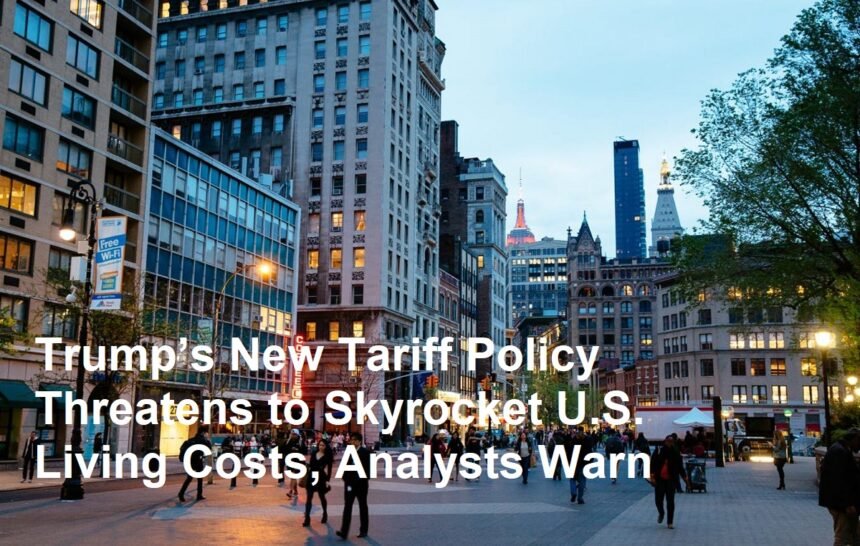The announcement of sweeping global tariffs by former President Donald Trump has sparked alarm among economists, who warn that the measures could trigger a sharp rise in living costs for American households, disproportionately burdening middle-class families and low-income workers. As markets reeled from Friday’s historic stock sell-off, experts cautioned that the proposed tariffs—touted by Trump as a tool to revive U.S. manufacturing—risk reigniting inflation, disrupting supply chains, and exacerbating financial strain on consumers already grappling with elevated prices for essentials like food, fuel, and housing.
Tariffs and Inflation: A Dangerous Combination
Trump’s plan, unveiled on April 4th, calls for a 10% baseline tariff on all imports entering the U.S., with higher rates targeting specific industries and trading partners accused of “unfair practices.” While the former president framed the policy as a revival of “America First” economic nationalism, analysts argue it could backfire by raising costs for imported goods—a category that accounts for nearly 15% of U.S. consumer spending. From electronics and clothing to automobiles and machinery, tariffs would likely force businesses to pass on higher expenses to customers, further squeezing household budgets.
“This isn’t 2018 anymore. The U.S. economy is still digesting the inflationary shocks of the pandemic and Ukraine war,” said Linda Johnson, chief economist at Barclays. “Adding tariffs into the mix now could push consumer prices up by 2–3 percentage points within a year, hitting lower- and middle-income families the hardest.”
Middle-Class Squeeze: Rising Costs, Stagnant Wages
Middle-class households, which spend a larger share of their income on taxable goods compared to wealthier Americans, are expected to bear the brunt of the tariff-induced price hikes. A study by the Peterson Institute for International Economics estimates that Trump’s 2018–2019 tariffs cost the average U.S. household approximately $1,300 annually through higher prices and reduced economic efficiency. This time, analysts warn the impact could be even more severe, given the broader scope of the proposed tariffs and the economy’s reduced capacity to absorb shocks.
Workers in industries reliant on imported materials, such as manufacturing and retail, also face heightened risks. Auto parts, construction equipment, and consumer electronics—all heavily dependent on global supply chains—would see production costs surge, potentially leading to layoffs or reduced hours. “Tariffs are essentially a tax on consumers and businesses,” said Mark Zandi, chief economist at Moody’s Analytics. “In an environment where wage growth is cooling and savings are depleted, this policy could push millions of families to the financial brink.”
Sector-Specific Fallout
Retailers like Walmart and Target, which source a significant portion of their merchandise from overseas, warned that tariffs would force them to raise prices on everyday items such as clothing, toys, and home goods. The National Retail Federation (NRF) called the proposal “a direct assault on American consumers,” noting that low-income families spend nearly 40% of their income on tariff-vulnerable goods.
The automotive sector, still recovering from pandemic-era supply chain disruptions, is bracing for another crisis. A 10% tariff on imported vehicles and components could add $2,500 to the average price of a new car, according to the Center for Automotive Research. For middle-class buyers already struggling with high interest rates, such increases could render car ownership unaffordable.
Agriculture is another flashpoint. Retaliatory tariffs from China and the EU—a near-certainty, analysts say—would devastate U.S. farmers reliant on exports. Soybean, pork, and dairy producers, still reeling from the 2018 trade war, fear losing critical foreign markets permanently. “Farmers are the collateral damage of these policies,” said Sarah Bloom, a third-generation Iowa soybean farmer. “When other countries retaliate, our livelihoods hang in the balance.”
Political Backlash and Policy Uncertainty
The Biden administration lambasted Trump’s tariff proposal as “short-sighted and destructive,” pledging to use “every legal tool” to block its implementation. However, with Trump leading in battleground state polls, markets are increasingly pricing in the risk of his return to the White House—and the inflationary policies that may follow.
Democrats have seized on the issue ahead of the November election, framing tariffs as a threat to working-class stability. “This isn’t about protecting jobs—it’s about political theater that working people will pay for,” said Senator Sherrod Brown (D-OH). Meanwhile, Trump allies argue that tariffs will ultimately strengthen U.S. industries. “Short-term pain for long-term gain,” said Senator Josh Hawley (R-MO). “We can’t let China and others undermine our economic sovereignty.”
Historical Parallels and Lingering Scars
The 2018–2019 U.S.-China trade war offers a cautionary tale. While Trump’s tariffs did reduce some imports from China, they failed to revive U.S. manufacturing jobs at scale. Instead, companies shifted sourcing to Vietnam, Mexico, and other nations, while American consumers and businesses absorbed over $40 billion in annual costs, according to the U.S. International Trade Commission.
Today, the risks are amplified. Inflation remains stubbornly above the Federal Reserve’s 2% target, and real wages have only recently begun outpacing price growth. With households’ credit card debt at record highs and pandemic savings exhausted, economists fear even modest price hikes could tip the economy into a downturn. “The middle class has no cushion left,” said Kristina Hooper, Invesco’s chief global market strategist. “This policy could be the straw that breaks the camel’s back.”
Long-Term Outlook: A Weaker Safety Net
Unlike the 2018 trade war, the U.S. now faces tighter fiscal constraints. With the national debt exceeding $34 trillion and political gridlock blocking new relief measures, the government has limited capacity to offset tariff-related pain through subsidies or tax cuts. States with high concentrations of manufacturing and agriculture workers, such as Michigan, Pennsylvania, and Wisconsin, could see unemployment spikes ahead of the election—a scenario that may force policymakers into reactive mode.
For now, uncertainty reigns. Businesses are delaying investments, families are trimming discretionary spending, and economists are revising growth forecasts downward. As the Fed weighs the timing of rate cuts, officials admit tariffs complicate their inflation fight. “We’re in a holding pattern,” said Chicago Fed President Austan Goolsbee. “The more tariffs disrupt the disinflation process, the longer Americans will suffer under high costs.”
Trump’s tariff gamble underscores the high-stakes intersection of trade policy and everyday economics. While the former president promises a renaissance for American industry, analysts see a recipe for renewed inflation, eroded purchasing power, and heightened inequality. For middle-class families already navigating a precarious financial landscape, the proposed tariffs threaten to deepen the divide between political rhetoric and economic reality. As the 2024 election looms, the debate over who truly pays the price of protectionism is only beginning.












